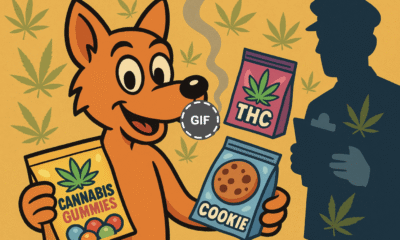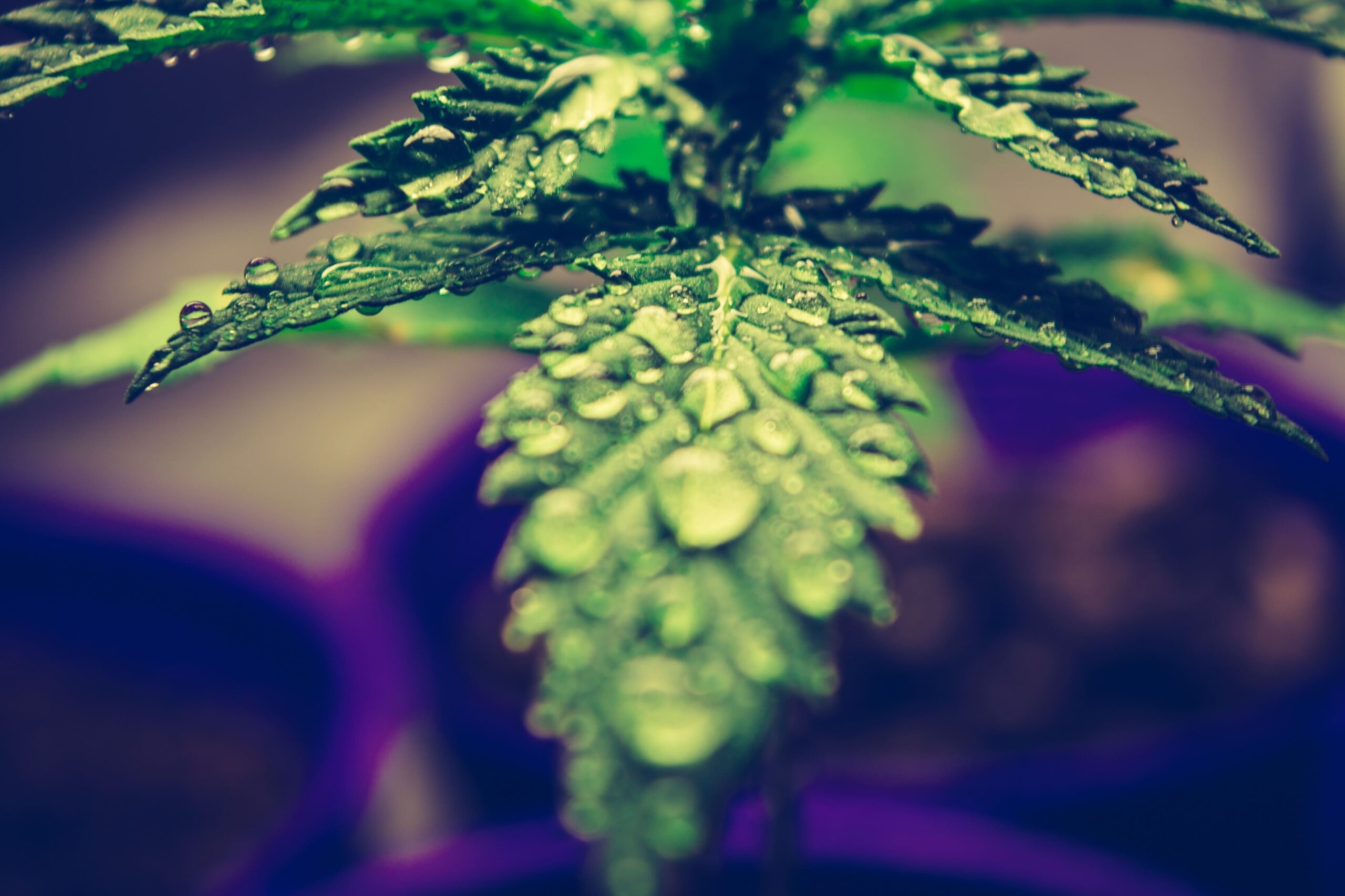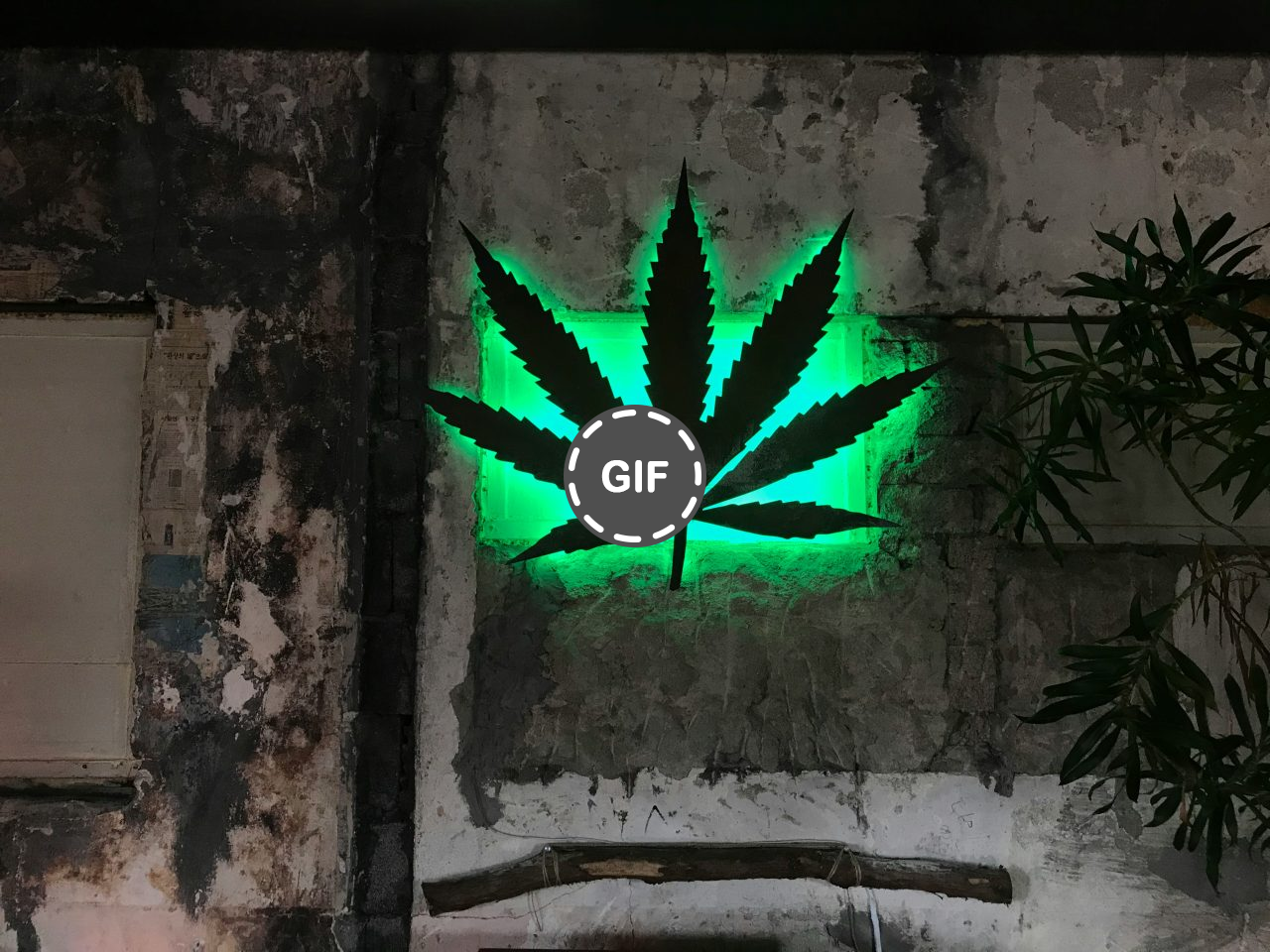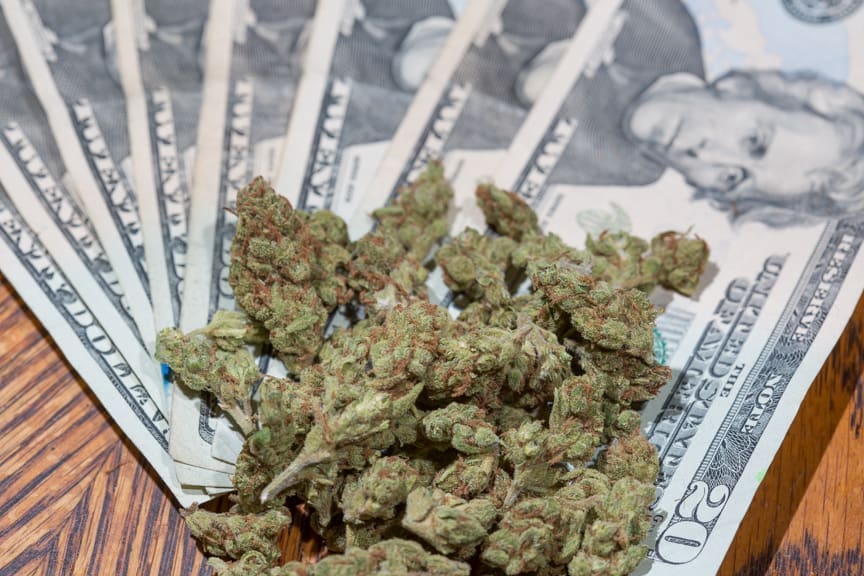featured
Changing Jobs And Thinking Of Cannabis
Published
5 months agoon

Starbucks is again changing their stores and dress code – maybe it is time to go to a more fun workplace?
For some, their look reflects who they are, even at work. There is a small uprising at Starbucks for a change in the dress code and front line employees are complaining. It leads people to asses where they are with employment? Perhaps time to consider changing jobs and thinking of cannabis? Working at a marijuiana dispensary offers a unique entry point into one of the fastest-growing industries in the United States. Whether passionate about cannabis, interested in retail, or seeking a new career path, dispensaries provide a range of roles, competitive pay, and opportunities for advancement.
RELATED: This Natural Cannabinoid Makes You Feel Happy
Despite the industry’s laid-back reputation, professionalism is key when applying for a dispensary job. For interviews, business casual attire is recommended: clean shirts or blouses, slacks or dress pants, and closed-toe shoes. Avoid jeans, shorts, short skirts, or anything too revealing. Ties and suit jackets are optional but more appropriate for management roles. Personal grooming is important—hair should be neat, and heavy fragrances should be avoided. Research the dispensary’s culture and match your attire to their environment could be a smart move, but when in doubt, dress more conservatively to make a strong first impression.

Dispensary jobs span from entry-level to management, with pay varying by position, experience, and location. The most common entry-level role is the budtender, who assists customers, recommends products, and ensures compliance with regulations. Budtenders typically earn around $36,000 annually, with hourly rates averaging $25.40, but ranging from $15.38 to $37.98 depending on the state and dispensary.
Other roles include:
-
Inventory Specialist: Manages stock and compliance, earning about $55,137 per year.
-
Security Guard: Ensures safety, with salaries starting at $38,294.
-
Compliance Specialist: Oversees legal adherence, starting at $89,600.
-
General Manager: Runs daily operations, with salaries from $78,900 and up.
-
Retail Specialist: Focuses on customer service, earning $40,000–$80,000 depending on experience and location.
Specialized positions such as extraction technicians, cultivators, and edibles manufacturing specialists can also be found, with salaries ranging from $33,000 to $140,000 or more, depending on expertise and responsibility.
RELATED: Cannabis Is Way Better And Safer Than A Honey Pack
The cannabis industry is rapidly expanding, offering significant room for growth. Entry-level employees can move up to supervisory or management roles, or transition into specialized areas like compliance, inventory management, or even cultivation and product development. Many dispensaries also offer temporary or contract positions, which can be a stepping stone to full-time employment.
Certifications or permits may be required, especially for budtenders and security staff, and requirements vary by state. Gaining experience in a dispensary can also open doors to higher-paying roles in cannabis business operations, marketing, or even ownership for entrepreneurial-minded individuals

Author: mscannabiz.com
MScannaBIZ for all you Mississippi Cannabis News and Information.
You may like
-


Feds provide anti-cannabis group a platform to bash legalization (Newsletter: September 15, 2025)
-


Dozen arrested after south Mississippi bust for illegal sales to underage customers
-


The Toking Traveler: Why Amsterdam Weed Is Mostly Boof
-


Arkansas Medical Marijuana Sales Are On Track To Set A New Annual Record
-


When Cannabis Brands Blur Into Youth Culture, Regulators Notice: Lessons From Tobacco’s Past
-


Rhode Island Marijuana Dispensary License Application Process Officially Launches
featured
Feds provide anti-cannabis group a platform to bash legalization (Newsletter: September 15, 2025)
Published
50 minutes agoon
September 15, 2025
DC marijuana expungement repeal advances in Congress; CA cannabis tax relief bill to gov; MA psychedelics vote; Study: Bongs don’t filter effectively
Subscribe to receive Marijuana Moment’s newsletter in your inbox every weekday morning. It’s the best way to make sure you know which cannabis stories are shaping the day.
Your support makes Marijuana Moment possible…
Free to read (but not free to produce)! We’re proud of our newsletter and the reporting we publish at Marijuana Moment, and we’re happy to provide it for free. But it takes a lot of work and resources to make this happen.
If you value Marijuana Moment, invest in our success on Patreon so we can expand our coverage and more readers can benefit: https://www.patreon.com/marijuanamoment
/ TOP THINGS TO KNOW
The Substance Abuse and Mental Health Services Administration provided a federally hosted platform for the prohibitionist organization Smart Approaches to Marijuana to claim that legalization does not diminish the illicit market and harms youth, despite data to the contrary.
The House Oversight and Government Reform Committee approved a bill to overturn a Washington, D.C. marijuana expungements law that was enacted by local officials in the nation’s capital.
The House Homeland Security Subcommittee on Oversight, Investigations & Accountability has scheduled a hearing about “how China is using marijuana to build a criminal network across America” for Thursday—though witnesses are currently unknown.
California lawmakers sent Gov. Gavin Newsom (D) a bill to pause a recently enacted tax hike on marijuana products, with the Assembly unanimously agreeing to the Senate’s amendments to the legislation.
The Massachusetts legislature’s Joint Committee on Mental Health, Substance Use and Recovery approved a bill to create a psychedelic therapy pilot program.
A new study comparing marijuana consumption methods found that “bong water does not seem to significantly filter out any compound from the smoke”—though the paper has now been withdrawn “because there may be a conflicting bureaucracy issue due to the location this research was performed.”
- Gas chromatography-mass spectrometry “results from both the bong and joint smoke show similar smoke composition. No compounds between 5 to 350 g/mol were completely filtered by the bong water.”
The Rhode Island Cannabis Control Commission is now accepting applications for 24 new marijuana dispensary business licenses—with six reserved for social equity applicants and six reserved for worker-owned cooperatives.
The Arkansas Department of Finance and Administration reported that dispensaries have sold $193.1 million worth of medical cannabis products so far this year, putting the state on pace to set a new annual record.
/ FEDERAL
Sen. Susan Collins (R-ME) commended law enforcement officials for taking action against illegal marijuana grow operations.
The House bill to designate psychedelic therapy centers of excellence got one new cosponsor for a total of 13.
/ STATES
Nebraska Gov. Jim Pillen (R) signed revised medical cannabis regulations.
Illinois Gov. J.B. Pritzker (D) is considering an executive order to address intoxicating hemp products.
Texas’s lieutenant governor criticized Gov. Greg Abbott’s (R) hemp executive order.
New Jersey’s Senate president said he supports legalizing limited home cultivation of marijuana and the creation of a state bank to serve cannabis businesses.
California regulators announced a recall of marijuana products due to noncompliant packaging and labeling, and inability to verify they were manufactured using good manufacturing practices.
Nevada regulators sent a bulletin about marijuana products that failed microbials testing.
New York regulators reached an agreement with marijuana dispensaries facing potential closure under a zoning law dispute that will allow the businesses to continue operating for at least five months.
Delaware regulators launched a social equity financial assistance grant program for cannabis businesses.
Oregon regulators will hold an advisory meeting about changes to cannabis rules on Tuesday.
—
Marijuana Moment is tracking hundreds of cannabis, psychedelics and drug policy bills in state legislatures and Congress this year. Patreon supporters pledging at least $25/month get access to our interactive maps, charts and hearing calendar so they don’t miss any developments.![]()
Learn more about our marijuana bill tracker and become a supporter on Patreon to get access.
—
/ LOCAL
New York City’s mayor was filmed in a marijuana dispensary saying, “It smells good in here.”
The Boston, Massachusetts Cannabis Board will meet on Wednesday.
/ INTERNATIONAL
Colombian President Gustavo Petro said that if cocaine were legalized worldwide, “there would be no destruction of the Amazon rainforest.”
A Netherlands court ordered a cannabis cultivation company to address odor issues.
/ SCIENCE & HEALTH
A study of UK doctors found that 87 percent would be open to prescribing medical cannabis to manage chronic pain.
A study’s results “support the therapeutic potential of liposome-based co-delivery of CBD and [celecoxib] in [glioblastoma multiforme] therapy.”
/ ADVOCACY, OPINION & ANALYSIS
The chair of the Florida Democratic Party tweeted about an upcoming congressional hearing on Chinese involvement in illegal marijuana operations, saying, “Simple solution…legalize and regulate.”
/ BUSINESS
RISE Dispensary workers in York, Pennsylvania are on strike.
/ CULTURE
Bryan Cranston spoke about microdosing psilocybin for the first time.
Make sure to subscribe to get Marijuana Moment’s daily dispatch in your inbox.

Author: mscannabiz.com
MScannaBIZ for all you Mississippi Cannabis News and Information.
featured
The Toking Traveler: Why Amsterdam Weed Is Mostly Boof
Published
19 hours agoon
September 14, 2025
You know those tequila shops in Mexico? The tourist traps in every major resort town that try to pass off random blends of grain spirits as the real-deal Holyfield blue agave tequila?
Yes, this may come as a shock to our audience, but if you have even the slightest sense of what defines a quality cannabis product, you may leave Amsterdam feeling a bit… hoodwinked. Bamboozled. Punk’d.
Firmly the mecca of cannabis since back in 1976, Amsterdam holds a special place in our stoner hearts because of their laissez-faire approach to recreational consumption. For many, a trip to their famed coffee shops was the first chance we had to legally get high. White Widow, AK-47, OG Kush…they seem to have all the classics, along with a laundry list of different Hazes (e.g, Amnesia Haze, a signature smoke of the Dutch).
On my most recent trip back in July, I stepped off the plane after a particularly hellish 20+ hour journey from LA to Istanbul before finally reaching Schiphol and beelined for The Bulldog, arguably the most famous coffee shop in existence. While I appreciated the conversations I had with other patrons and staff alike, including a gregarious German home grow enthusiast living on an isolated island in the Caribbean, only in town while on his way to Eastern Europe for “the REAL Dracula history tour, not the one you see in guides,” the caliber of social interaction doesn’t really make up for how subpar their cannabis is.
Imagine an OG Kush that doesn’t look like OG, doesn’t smell like OG, or even hit you like OG. Yeah, it’s even more of a gutpunch after you realize you dropped $18 on a single gram of it.
Do the Dutch simply not care about quality? Or perhaps they mix so much damn tobacco into their spliffs that it doesn’t matter?
In my travels, I met many locals who also bemoaned their city’s lack of quality. This all stems from the fact that the Dutch have adopted a “tolerance policy,” as while cannabis (and other substances) do remain federally illegal in the Netherlands, they’ve realized that attempting to regulate often does more harm than good. Who’d have thought?!?
While there is essentially zero enforcement around the use of “soft drugs”, such as cannabis and psilocybin truffles, the rest of the supply chain is a fragmented nightmare of backroom deals and questionable practices. Simply stated, it’s all illicit market product.
Their system is entirely built around rewarding the lowest cost of production, regardless of safety or standards. Any cannabis you’ll find in Amsterdam hasn’t been lab tested, meaning that harmful bacteria, pesticides, and who knows what else are likely present in your bag. They’re able to get away with it, as most of the tourists crawling the Red Light District will never return to that same shop. It’s designed to run efficiently and without accountability.
Case in point:
- It is illegal to possess or use cannabis.
- It is illegal to commercially grow cannabis.
- It is legal for coffeeshops to sell you cannabis, but not for them to acquire that cannabis, so it “magically appears” for sale at each location.
Curious, eh? This is also why there is a very high probability that your coffee shop cannabis was grown on the top floor of a local high-rise apartment building by an organized criminal syndicate (and yes, they own/operate the rest of the space to provide cover). Your OG isn’t true OG because there are no repercussions if it’s not.
Now, the one exception where you can find true-to-strain cuts seems to be most of the Haze cultivars, as these are massively popular in Europe (and thus with locals) and known for being premium quality, so the bar is often a bit higher.
Fortunately, the times they are a-changin’ and even a craft rosin scene has started to develop in the city. I was personally blown away by the service I received at Boerejongens, a coffee shop that the headiest of locals kept endorsing. Outside of their shop, I was greeted by an employee in a sharp bowler hat and three-piece suit. These guys serve as de facto guardians of the neighborhood community, helping to ensure that anyone visiting doesn’t get too unruly. They’ll even help little old ladies cross the street or provide expert-level guidance to anyone lost, customer or otherwise. Inside the store, the “hipster barista” meme has been taken to wholly new levels, as there was a row of budtenders decked out in white butchers’ aprons, wielding giant butchers’ knives to chop up flower into your desired quantities. The Strawberry Haze at Boerejongens ran circles around everything else I procured, outside of a decent Blueberry Haze I found near Vondelpark.
Next time you’re ready to enjoy a toke as you navigate Amsterdam’s canals, do yourself a favor and avoid the touristy areas like the plague. The further you’re away from the Red Light District (and I’m sad to say, shops like The Bulldog), the closer you are to finding buds that won’t just scratch your itch but will truly impress you.
Photo by Jinsoo Choi on Unsplash

Author: mscannabiz.com
MScannaBIZ for all you Mississippi Cannabis News and Information.
featured
Arkansas Medical Marijuana Sales Are On Track To Set A New Annual Record
Published
21 hours agoon
September 14, 2025
“A total of $1.5 billion has been spent on medical marijuana since the state’s first dispensary opened in May 2019.”
By Sonny Albarado, Arkansas Advocate
Arkansans spent $10 million more on medical marijuana so far this year than during the first eight months of 2024, putting the state on track to exceed a record set two years ago, according to the state finance department.
From January through August, Arkansans bought $193.1 million in medical marijuana products from the state’s dispensaries, compared with $182.5 million in the same period last year, according to a press release from the state Department of Finance and Administration.
“With daily sales averaging about $800,000 in 2025, we are on track to surpass the 2023 sales record of $283 million,” department spokesperson Scott Hardin said.
There has also been a significant year-to-year increase in the number of pounds of cannabis sold, Hardin said, with the 2025 total at 52,292 pounds.
The state collected $5.38 million in tax revenue from medical marijuana in July and August, bringing the total tax haul so far this year to $21.57 million.
Patients spent $24,262,201 in July, purchasing 6,721 pounds, and $24,647,170 in August, buying 6,778 pounds, according to the finance department.
Suite 443 in Hot Springs and Natural Relief Dispensary in Sherwood sold the most medical marijuana in both July and August, according to the press release. Suite 443 sold 1,419.6 pounds total for both months. Natural Relief sold 1,317.7 pounds over July and August.
“A total of $1.5 billion has been spent on medical marijuana since the state’s first dispensary opened in May 2019,” Hardin said.
The Arkansas Department of Health reports 109,060 active patient cards. The Medical Marijuana Commission has licensed 38 dispensaries but only 36 are operating, Hardin said. The license of one of the closed dispensaries was revoked by the state Alcoholic Beverage Control Board last year, and its owner’s appeal of the revocation remains before the courts.

Author: mscannabiz.com
MScannaBIZ for all you Mississippi Cannabis News and Information.

Feds provide anti-cannabis group a platform to bash legalization (Newsletter: September 15, 2025)

Dozen arrested after south Mississippi bust for illegal sales to underage customers

The Toking Traveler: Why Amsterdam Weed Is Mostly Boof

Arkansas Medical Marijuana Sales Are On Track To Set A New Annual Record

When Cannabis Brands Blur Into Youth Culture, Regulators Notice: Lessons From Tobacco’s Past

Rhode Island Marijuana Dispensary License Application Process Officially Launches

Middle school student found with cannabis in bookbag, Charles County deputies say

Smugglers who brought drugs on an industrial scale into Wales jailed

Attorney pulls out bag of cannabis in NC Supreme Court hearing

WHO AM I? Man wanted for New Bern cannabis store theft

Cannabis packages under scrutiny

California authorities shut down nearly $30 million worth of illegal cannabis operations

A Green Light for Cannabis? Europe Waits While the U.S. Untangles the Red Tape

Move Over, Booze: Weed Drinks Pulled $1.1 Billion in U.S. Sales in 2024

Congressional Committee Votes To Repeal Marijuana Expungements Law In Washington, D.C.

Times Square Welcomed Its Brightest Cannabis Billboard Yet

Smoking Marijuana With A Water Bong Doesn’t Effectively Filter Compounds From Smoke, Study Suggests

A Beginner’s Guide for Watering Cannabis Plants

Massachusetts Lawmakers Approve Bill To Create Psychedelic Therapy Pilot Program

From the Dark Web to the Streets: Meet the Canadian Distributing Pure Cocaine to Save Lives

Congressional Committee Schedules Hearing On Chinese ‘Invasion’ Through ‘Illegal Marijuana’ Operations

Carmelo Anthony Marks Hall of Fame With Hall of Flame Cannabis Drop

California: Lawmakers Advance Legislation to Governor’s Desk Halting Tax Hike on Commercially Available Cannabis Products

Federal Agency Gives Anti-Marijuana Group A Platform To Make Claims About Legalization’s Impact That Aren’t Supported By Data

Alert: Department of Cannabis Control updates data dashboards with full data for 2023

Connecticut Appoints The US’s First Cannabis Ombudsperson – Yes there is a pun in there and I’m Sure Erin Kirk Is Going To Hear It More Than Once!

5 best CBD creams of 2024 by Leafly

EU initiative begins bid to open access to psychedelic therapies
New Study Analyzes the Effects of THCV, CBD on Weight Loss

Free delta-9 gummies from Bay Smokes

5 best autoflower seed banks of 2024 by Leafly

Discover New York’s dankest cannabis brands [September 2024]

Press Release: CANNRA Calls for Farm Bill to Clarify Existing State Authority to Regulate Hemp Products

Curaleaf Start Process Of Getting Their Claws Into The UK’s National Health System – With Former MP (Resigned Today 30/5/24) As The Front Man

May 2024 Leafly HighLight: Pink Runtz strain

Local medical cannabis dispensary reacts to MSDH pulling Rapid Analytics License – WLBT

Recreational cannabis on ballot for third time in South Dakota

5 best THC drinks of 2024 by Leafly

Horn Lake denies cannabis dispensary request to allow sale of drug paraphernalia and Sunday sales | News

Mississippi city official pleads guilty to selling fake CBD products

6 best CBD gummies of 2024 by Leafly

Nevada CCB to Accept Applications for Cannabis Establishments in White Pine County – “Only one cultivation and one production license will be awarded in White Pine County”

The Daily Hit: October 2, 2024

5 best delta-9 THC gummies of 2024 by Leafly

Weekly Update: Monday, May 13, 2024 including, New Guide for Renewals & May Board meeting application deadline

PRESS RELEASE : Justice Department Submits Proposed Regulation to Reschedule Marijuana

5 best THCA flower of 2024 by Leafly

People In This State Googled ‘Medical Marijuana’ The Most, Study Shows
Trending
-

 California Cannabis Updates1 year ago
California Cannabis Updates1 year agoAlert: Department of Cannabis Control updates data dashboards with full data for 2023
-

 Breaking News1 year ago
Breaking News1 year agoConnecticut Appoints The US’s First Cannabis Ombudsperson – Yes there is a pun in there and I’m Sure Erin Kirk Is Going To Hear It More Than Once!
-

 best list1 year ago
best list1 year ago5 best CBD creams of 2024 by Leafly
-

 Business12 months ago
Business12 months agoEU initiative begins bid to open access to psychedelic therapies
-

 cbd1 year ago
cbd1 year agoNew Study Analyzes the Effects of THCV, CBD on Weight Loss
-

 Bay Smokes1 year ago
Bay Smokes1 year agoFree delta-9 gummies from Bay Smokes
-

 cannabis brands12 months ago
cannabis brands12 months agoDiscover New York’s dankest cannabis brands [September 2024]
-

 autoflower seeds12 months ago
autoflower seeds12 months ago5 best autoflower seed banks of 2024 by Leafly

